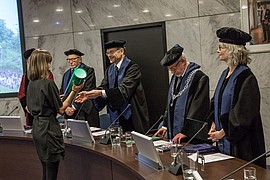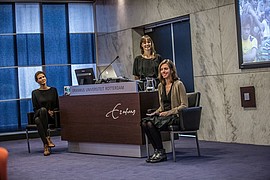PhD Defence: Romy Krämer

In her dissertation ‘A License to Mine? Community Organizing Against Multinational Corporations’, ERIM’s Romy Krämer explores the practitioner concept of the license to operate and develops this into a theoretical framework. Furthermore, she sheds light on the organizing processes in anti-corporate movements and highlights the importance of national advocacy networks for successful movement building across borders
Romy Krämer defended her dissertation in the Senate Hall at Erasmus University Rotterdam on Thursday, 18 November 2016 at 09:30. Her supervisor was Prof. Rob van Tulder. Her co-supervisor was Prof. Gail Whiteman. Other members of the Doctoral Committee were Prof. Frank den Hond (Hanken Business School), Dr. Bobby Banerjee (City University London), Prof. Slavek Magala (RSM), and Prof. Jan Rotmans (DRIFT)
About Romy Krämer

Romy Krämer was born on 12 March, 1981 in the Eastern part of Berlin. After studying Work & Organization Psychology in Leipzig, she joined the Industrial Psychology Research Centre in Aberdeen, Scotland to conduct applied research on collaboration among virtual teams in the oil industry. Intrigued by the complex set of social and environmental externalities produced by the oil and other extractive industries, Romy decided to more deeply explore CSR practices and anti-corporate campaigning in this context.
She joined the Rotterdam School of Management as a PhD student and spent several months with anti-mining activists in Orissa, India for her field research. Next to her PhD, Romy contributed to the set-up of the Greening the Campus initiative at the Erasmus University Rotterdam and ran the work group on sustainable catering.
Back in Berlin, Romy joined the DO School as a Program Director in 2011 to build and implement a social entrepreneurship course for international impact entrepreneurs. Together with her team, she also developed the world's first Massive Open Online Course that supported social entrepreneurs in their start-up journey. In 2015 Romy returned to academia as a freelancer to teach Business Ethics and CSR at the Kühne Logistics University in Hamburg. In her current role as the Managing Director of the Guerrilla Foundation, Romy once more has the chance to work with activists and social movements.
Romy enjoys working with individuals and organizations at the intersection of activism, social entrepreneurship, and ethical business and will continue to be active in these fields while moving between academia and practice.
Thesis Abstract

What does it mean when a corporation claims to have a ‘license to operate’ in a local community? How does a member of an indigenous tribe make it to London to protest against a multinational mining company? How do managers perceive and speak about protest against their company and how does this discourse matter for social movement repression? First, I argue, based on a literature review, that responsiveness to local community needs has become an important factor influencing the ability of multinational enterprises to successfully internationalize their operations. Then, I explore the practitioner concept of the license to operate and develop this into a theoretical framework. Based on a case study of an anti-mining movement, that grew from the initial local community resistance in a remote Indian mountain range into a translocal movement, I try to answer the remaining questions empirically. To shed light on the organizing processes in anti-corporate movements, my co-authors and I trace the journey of a young man who for a short time became one of the leading figures in the anti-mining movement but later changed sides to support the company. We also highlight the importance of national advocacy networks for successful movement building across borders. Finally, I analyze the managerial discourse about the anti-mining resistance and link it to the repression of social movement actors by the police and other stakeholders. Overall, this dissertation builds on and advances the growing literature on anti-corporate social movements.
Photos: Chris Gorzeman / Capital Images


